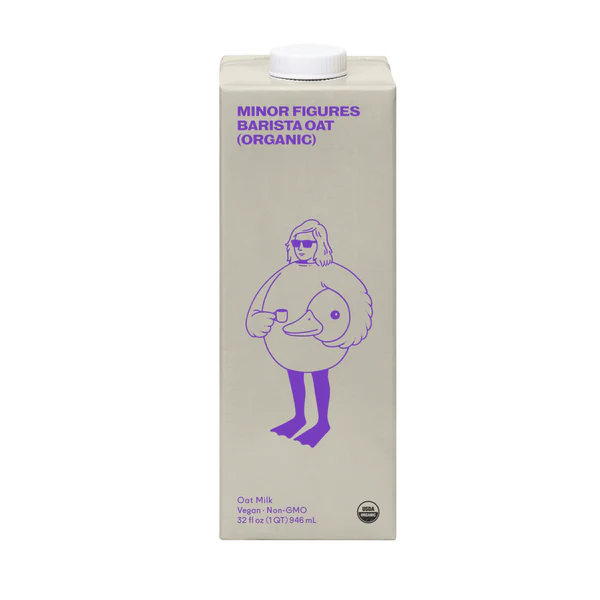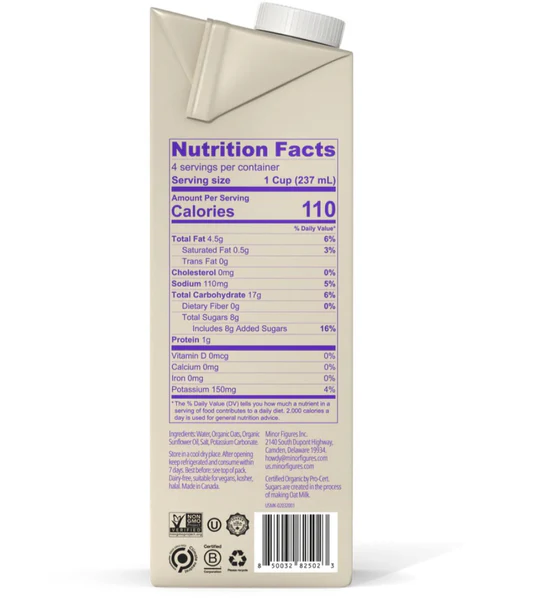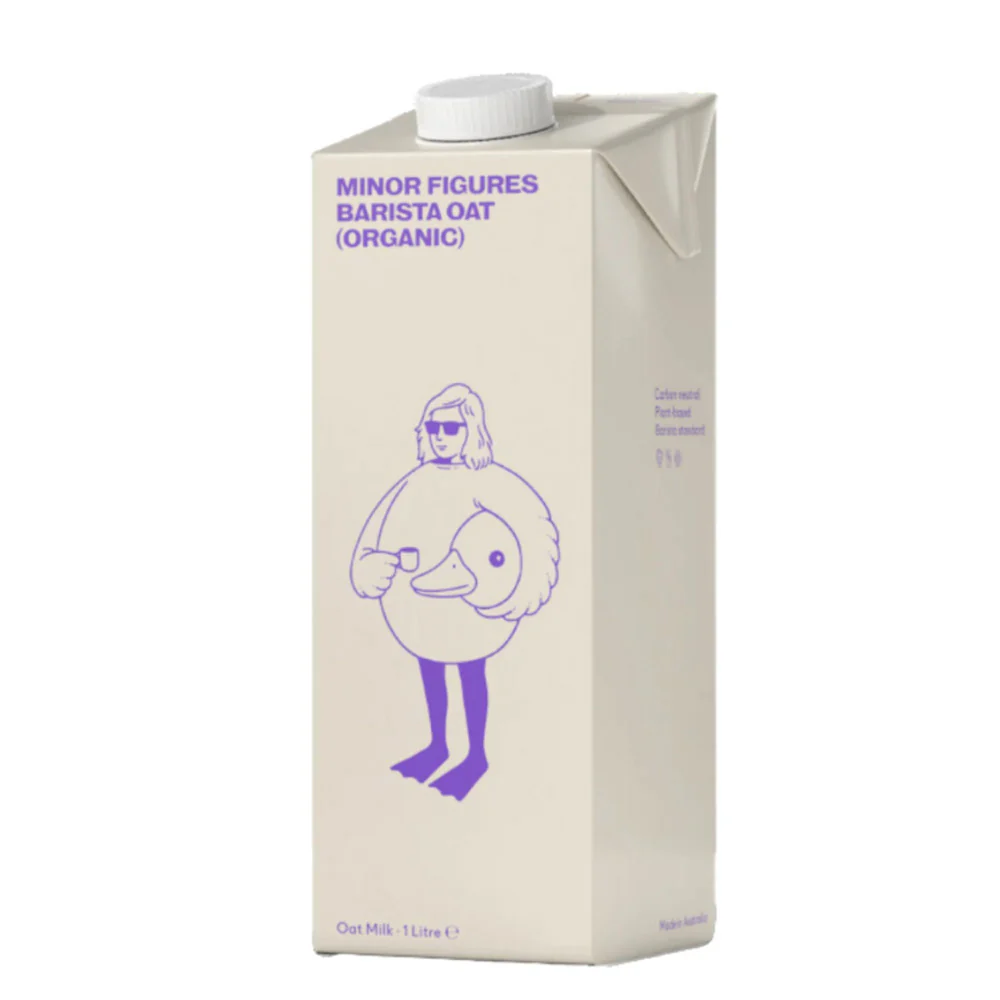Oat Milk: The Good, The Bad, and The Science
- Natalie Tarin
- Jun 20, 2025
- 4 min read
Oat milk, made from oats and water, has gained popularity for several reasons, but it's important to look at the full picture.
The Good: What People Love About Oat Milk
Creamy Texture and Taste: This is arguably oat milk's biggest win, especially for coffee lovers. Its natural creaminess and subtle sweetness make it an excellent dairy alternative for lattes, cappuccinos, and even cereal. Many find it to be the closest in texture to dairy milk compared to other plant-based options.
Allergy-Friendly: For those with allergies to dairy, soy, or nuts, oat milk offers a safe and delicious alternative. It's naturally lactose-free, soy-free, and nut-free, making it a great choice for a wider range of dietary needs [1, 2].
Good Source of B Vitamins (Often Fortified): Many commercial oat milk brands are fortified with essential B vitamins like Riboflavin (B2) and B12, which are crucial for energy production and overall health, especially for those on plant-based diets [1, 2].
May Lower LDL ("Bad") Cholesterol: Oats are rich in beta-glucan, a soluble fiber that forms a gel-like substance in your gut. This can bind to cholesterol and reduce its absorption, potentially lowering LDL cholesterol levels, which is beneficial for heart health [1, 2].
Environmentally Friendly: Compared to dairy milk and even some other plant milks (like almond milk, which requires significant water), oat milk generally boasts a lower environmental footprint in terms of greenhouse gas emissions, land use, and water consumption [1, 2, 4].
Contains Fiber: Unlike cow's milk, oat milk naturally contains dietary fiber, which is beneficial for digestive health [3].

The Bad: Common Criticisms and Considerations
Higher in Carbohydrates and Calories: Oat milk tends to have more carbohydrates and calories than almond or soy milk. While this can be a benefit for some, it's a consideration for individuals managing blood sugar levels or calorie intake [1, 5].
Added Sugars and Oils: Some commercially available oat milks, especially flavored varieties, can contain significant amounts of added sugars. Many also include added oils (like rapeseed or sunflower oil), thickeners, or stabilizers to enhance texture and shelf life, which can be a concern for those seeking "cleaner" labels [1, 2, 4].
Lower Protein Content: Oat milk typically contains less protein than cow's milk or soy milk [1, 3, 5]. This means it may not be as satiating and might require individuals on plant-based diets to seek protein from other food sources.
Ultra-Processed Food Classification: Due to the manufacturing process involving grinding, enzyme treatment, and filtering, some experts classify commercial oat milk as an "ultra-processed food" (UPF). While research on UPFs is ongoing, some studies suggest a link between high UPF consumption and increased risk of certain health conditions [3].
Potential for Gluten Contamination: While oats are naturally gluten-free, they can be processed in facilities that also handle gluten-containing grains. For individuals with celiac disease or gluten sensitivity, it's crucial to look for oat milk certified as gluten-free [1, 2].
Glycemic Index Concerns: The natural starches in oats break down into glucose, which can lead to a rise in blood sugar levels. For people with diabetes or prediabetes, monitoring intake and choosing unsweetened options is particularly important [4, 5].
Why Minor Figures Barista Organic Oat Milk is a Superior Choice
At We Eat Organic, we are meticulous about the products we offer. When it comes to oat milk, we proudly champion Minor Figures Barista Organic Oat Milk (available as part of our distribution to cafes, restaurants, and supermarkets across Taguig, Metro Manila, and the Philippines). It addresses many of the "bad" points raised about oat milk, offering a genuinely superior option for both your health and your coffee.
Here's why Minor Figures stands out:
Certified Organic Ingredients: This is paramount. Minor Figures uses Organic Oats and Organic Rapeseed Oil [6]. Choosing organic means avoiding pesticides and synthetic fertilizers, aligning with our commitment to products that are good for you and good for the environment. This directly addresses concerns about potential contaminants in non-organic oats.
Minimalist, Clean Ingredient List: Unlike many competitors loaded with unnecessary additives, Minor Figures keeps it incredibly simple: Water, Organic Oats (11-12%), Organic Rapeseed Oil, Salt, and Acidity Regulator (Potassium Carbonate) [6, 7, 8]. This short, understandable list means fewer "ultra-processed" elements and a focus on the natural goodness of the oats.
No Added Sugar: A crucial differentiator! Minor Figures Barista Organic Oat Milk contains no added sugar [6, 7, 8, 9]. The sugars present are naturally occurring from the oats. This is vital for those managing blood sugar and anyone seeking a healthier, less processed beverage. This directly counters one of the biggest criticisms of many oat milks.
Barista-Designed for Performance: This oat milk isn't just "okay" in coffee; it's specifically formulated by coffee professionals to perform exceptionally well. It steams beautifully, creating a silky microfoam without splitting, enhancing the true flavor of your coffee [9]. This is a testament to its quality and thoughtful composition.
Carbon Neutral Certification: Minor Figures is a certified carbon-neutral company [9]. This commitment to offsetting their environmental impact aligns perfectly with We Eat Organic's dedication to sustainability and makes it a choice you can feel truly good about.
Balanced Fat Content: The inclusion of organic rapeseed oil contributes to the desirable creamy texture without relying on excessive saturated fats, aiding in its barista performance and overall mouthfeel [6].
In conclusion, while the world of plant-based milks can be confusing, understanding the nuances and scrutinizing ingredient lists is key. At We Eat Organic, we believe that Minor Figures Barista Organic Oat Milk rises above the rest. It's a testament to how conscious ingredient choices and thoughtful formulation can create a product that is not only delicious and versatile but also genuinely good for your well-being and the planet.
Choose smart. Choose organic. Choose Minor Figures.
Sources:
WebMD. Should You Switch to Oat Milk? https://www.webmd.com/diet/switch-oat-milk
Healthline. Oat Milk: How to Make It, Plus Nutrition and Benefits. https://www.healthline.com/nutrition/oat-milk
GoodRx. Is Oat Milk Good or Bad for You? A Dietitian Explains. https://www.goodrx.com/well-being/diet-nutrition/is-oat-milk-good-or-bad
Cosmopolitan UK. Is oat milk good or bad for you? Let's look at the pros, cons and sugar content. https://www.cosmopolitan.com/uk/body/diet-nutrition/a46682814/oat-milk-good-for-you/
Health. Oat Milk vs. Almond Milk: Which Is Healthier? https://www.health.com/oat-milk-vs-almond-milk-8759339
Ocado Zoom. Minor Figures Organic Barista Oat Milk 1l. https://zoom.ocado.com/minor-figures-organic-barista-oat-milk-1l-513093011
Open Food Facts. Minor Figures Barista Oat organic - 1L. https://world.openfoodfacts.org/product/5060406080452/minor-figures-barista-oat-organic
Minor Figures AU. BARISTA OAT (ORGANIC). https://au.minorfigures.com/products/organic-oat-milk
Amazon UK. Minor Figures - Oat Milk, Barista Standard, 1 Litre x 12 Cartons. https://www.amazon.co.uk/Minor-Figures-Milk-Barista-2x6L/dp/B086GGXJQ6





